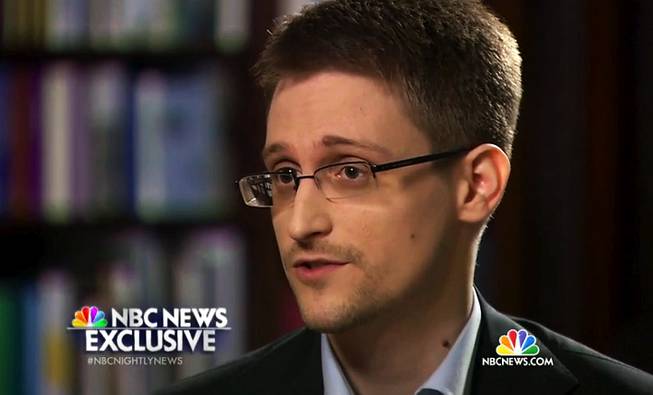
AP Photo/NBC News
In this image taken from video provided by NBC News on Tuesday, May 27, 2014, Edward Snowden, a former National Security Agency (NSA) contractor, speaks to NBC News anchor Brian Williams during an NBC Exclusive interview.
Tuesday, Sept. 30, 2014 | 2 a.m.
View more of the Sun's opinion section
Edward Snowden appears this month on the cover of Wired magazine from his hideout in Russia, clutching an American flag. It’s an image bound to rile folks who consider the former National Security Agency worker more traitor than patriot for leaking classified documents he stole.
You’ve probably had an argument with someone about the ethics of what he did and how far an insider with access to state secrets can justifiably go to hold government accountable.
Earlier this month, I got to put my questions to Snowden’s lawyer, Ben Wizner. He was in Iowa to give a Constitution Day speech at Simpson College. Snowden himself is overseas, trying to avoid being captured and tried by U.S. authorities under the Espionage Act.
For Wizner, who heads the ACLU’s speech, privacy and technology branch, the ethical question is less what Snowden did than what the U.S. government, with the consent of all three branches, has been doing to its citizens.
The first bombshell from Snowden’s leaked documents was Verizon being ordered by the Foreign Intelligence Surveillance Court to turn over all the phone records of all its customers.
“The public needed to be shocked,” Wizner told an informal group at an ACLU supporter’s house that included professors, lawyers, activists and ACLU staff. He called what Snowden did a courageous act of lawbreaking and said prosecuting him as a felon is “perverse.” Wizner pointed out surveillance technologies “have outpaced democratic controls.”
Journalists, and by extension the public, depend on leakers and whistle-blowers to keep officials honest. On the flip side, though national security threats have at times been falsely invoked to take away civil liberties or rally support for an embattled president, governments need to keep some secrets for safety.
Snowden left the agency with tens of thousands of classified documents. That’s an extraordinary amount of responsibility for someone who wasn’t even 30 at the time to shoulder.
Wizner doesn’t believe there is a definitive answer. He agreed there are legitimate state secrets, including the identities of undercover agents and troop movements on battlefields. But, he said, “It’s always a give-and-take and a tug-of-war.” The government’s monopoly needs balancing.
He’s right. Without government insiders slipping information to the press, we wouldn’t know about the abuses at Abu Ghraib, about false pretenses for the Iraq war, about CIA drone strikes maiming and killing civilians and about torture we have committed in interrogations. The only factor differentiating the Snowden leaks from previous ones, Wizner argued, was the scale of the information released.
Wizner’s remarks focused more on the kinds of information our agencies are collecting than what they’re doing with it. But on the same day, James Bamford, who interviewed Snowden in Russia and wrote the Wired cover story, disclosed in a New York Times column some uses that should make our blood boil.
The NSA has been intercepting emails and phone calls of U.S. citizens of Arab and Palestinian origin and sending the information to a secret Israeli military unit. According to Bamford, that information has included the “sexual orientations, infidelities, money problems, family medical conditions and other private matters.”
Their names and identities were left in, putting their relatives in Israel and Palestinian territories, who may be part of those communications, at risk. A letter of protest against the policy by 43 veteran and current Israeli military members to Prime Minister Benjamin Netanyahu and military brass said the information obtained that way was used to persecute innocent Palestinians and pressure them to collaborate.
In another document Snowden released, the former NSA director wrote of compiling records on six Muslims considered “radicalizers,” but not necessarily terrorists. The agency was tracking their visits to pornographic websites, to be used to discredit them.
If this is what passes for national security or foreign policy, we’re all in trouble. What business do we have gathering personal information on innocent people, much less sharing it with a foreign government for use in blackmail? How can official statements of neutrality on the Middle East be taken seriously? What other sleazy covert foreign policy strategies are we pursuing? And how does this keep us safe?
Knowing all this does not give me confidence in my government, but it does tend to vindicate Snowden’s actions. Maybe he did betray the government’s trust, but the government has been betraying the people’s trust to a far greater degree.
Rekha Basu is a columnist for the Des Moines Register.

Join the Discussion:
Check this out for a full explanation of our conversion to the LiveFyre commenting system and instructions on how to sign up for an account.
Full comments policy